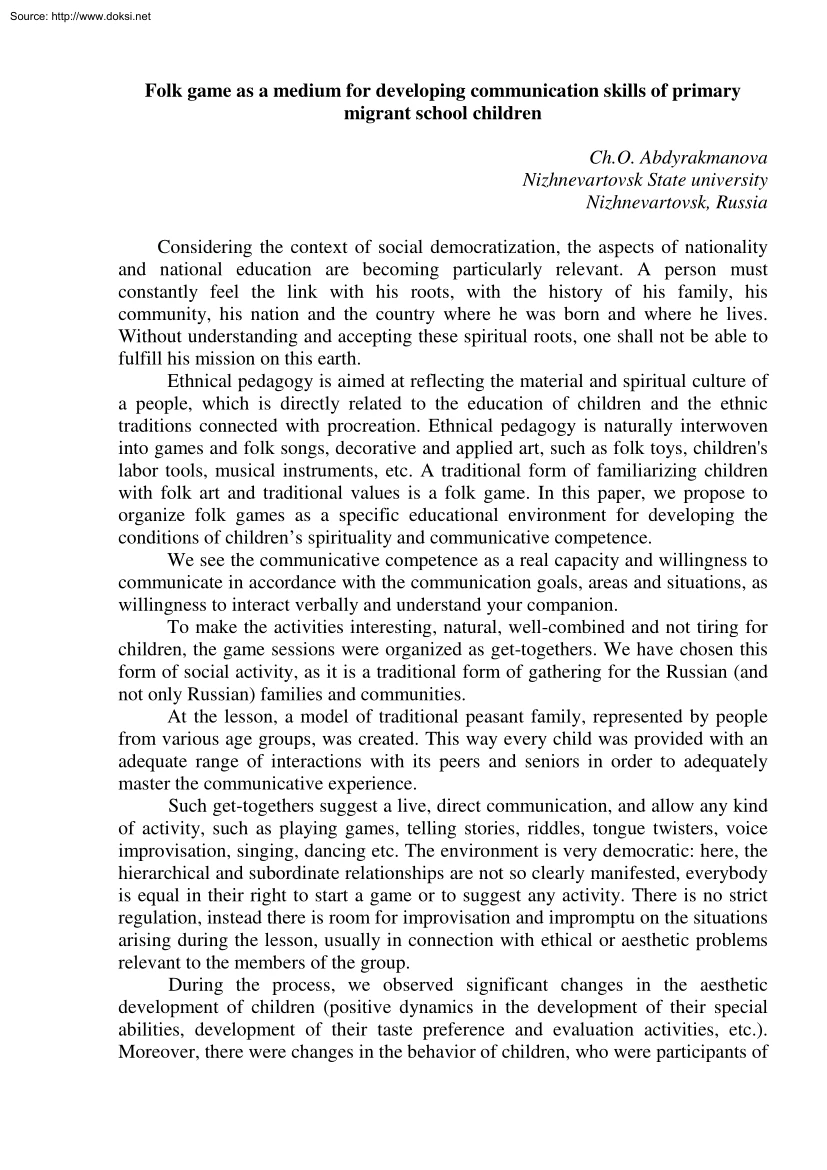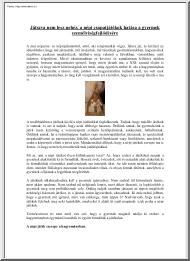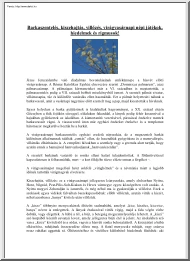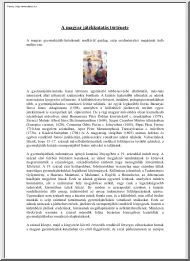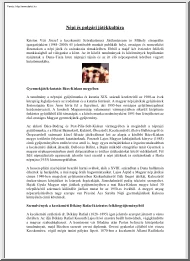Datasheet
Year, pagecount:2015, 2 page(s)
Language:English
Downloads:2
Uploaded:December 21, 2017
Size:458 KB
Institution:
-
Comments:
Nizhnevartovsk State university
Attachment:-
Download in PDF:Please log in!
Comments
No comments yet. You can be the first!Content extract
Source: http://www.doksinet Folk game as a medium for developing communication skills of primary migrant school children Ch.O Abdyrakmanova Nizhnevartovsk State university Nizhnevartovsk, Russia Considering the context of social democratization, the aspects of nationality and national education are becoming particularly relevant. A person must constantly feel the link with his roots, with the history of his family, his community, his nation and the country where he was born and where he lives. Without understanding and accepting these spiritual roots, one shall not be able to fulfill his mission on this earth. Ethnical pedagogy is aimed at reflecting the material and spiritual culture of a people, which is directly related to the education of children and the ethnic traditions connected with procreation. Ethnical pedagogy is naturally interwoven into games and folk songs, decorative and applied art, such as folk toys, childrens labor tools, musical instruments, etc. A traditional form
of familiarizing children with folk art and traditional values is a folk game. In this paper, we propose to organize folk games as a specific educational environment for developing the conditions of children’s spirituality and communicative competence. We see the communicative competence as a real capacity and willingness to communicate in accordance with the communication goals, areas and situations, as willingness to interact verbally and understand your companion. To make the activities interesting, natural, well-combined and not tiring for children, the game sessions were organized as get-togethers. We have chosen this form of social activity, as it is a traditional form of gathering for the Russian (and not only Russian) families and communities. At the lesson, a model of traditional peasant family, represented by people from various age groups, was created. This way every child was provided with an adequate range of interactions with its peers and seniors in order to adequately
master the communicative experience. Such get-togethers suggest a live, direct communication, and allow any kind of activity, such as playing games, telling stories, riddles, tongue twisters, voice improvisation, singing, dancing etc. The environment is very democratic: here, the hierarchical and subordinate relationships are not so clearly manifested, everybody is equal in their right to start a game or to suggest any activity. There is no strict regulation, instead there is room for improvisation and impromptu on the situations arising during the lesson, usually in connection with ethical or aesthetic problems relevant to the members of the group. During the process, we observed significant changes in the aesthetic development of children (positive dynamics in the development of their special abilities, development of their taste preference and evaluation activities, etc.) Moreover, there were changes in the behavior of children, who were participants of Source: http://www.doksinet
a communicative act, in terms of the level and quality of their relevant competences, tastes and preferences
of familiarizing children with folk art and traditional values is a folk game. In this paper, we propose to organize folk games as a specific educational environment for developing the conditions of children’s spirituality and communicative competence. We see the communicative competence as a real capacity and willingness to communicate in accordance with the communication goals, areas and situations, as willingness to interact verbally and understand your companion. To make the activities interesting, natural, well-combined and not tiring for children, the game sessions were organized as get-togethers. We have chosen this form of social activity, as it is a traditional form of gathering for the Russian (and not only Russian) families and communities. At the lesson, a model of traditional peasant family, represented by people from various age groups, was created. This way every child was provided with an adequate range of interactions with its peers and seniors in order to adequately
master the communicative experience. Such get-togethers suggest a live, direct communication, and allow any kind of activity, such as playing games, telling stories, riddles, tongue twisters, voice improvisation, singing, dancing etc. The environment is very democratic: here, the hierarchical and subordinate relationships are not so clearly manifested, everybody is equal in their right to start a game or to suggest any activity. There is no strict regulation, instead there is room for improvisation and impromptu on the situations arising during the lesson, usually in connection with ethical or aesthetic problems relevant to the members of the group. During the process, we observed significant changes in the aesthetic development of children (positive dynamics in the development of their special abilities, development of their taste preference and evaluation activities, etc.) Moreover, there were changes in the behavior of children, who were participants of Source: http://www.doksinet
a communicative act, in terms of the level and quality of their relevant competences, tastes and preferences
